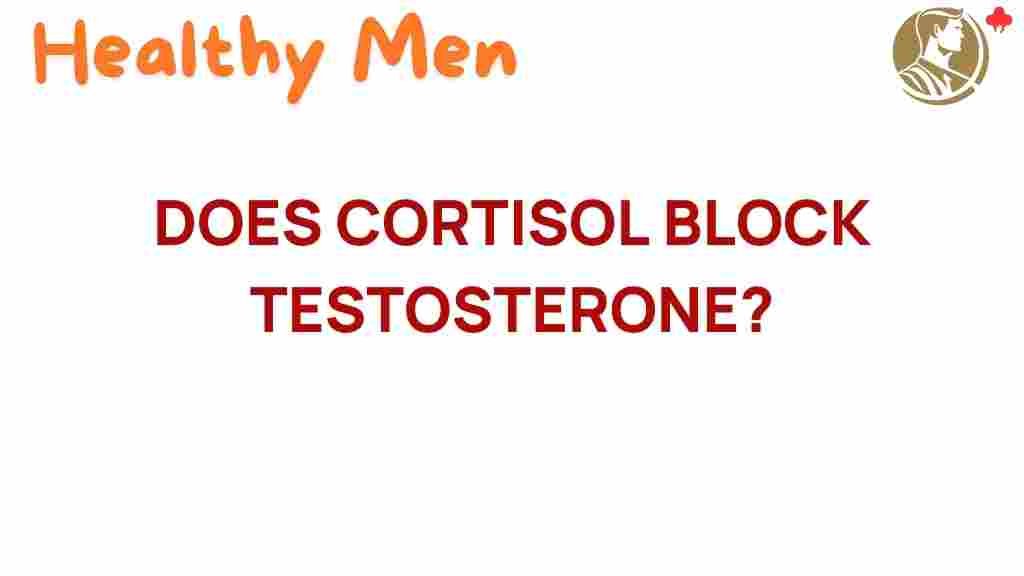Unraveling the Mystery: Does Cortisol Block Testosterone?
In the intricate world of human biology, hormones play a crucial role in maintaining health and wellness. Among these hormones, cortisol and testosterone are two of the most significant. As stress levels rise, many people wonder about the relationship between these two hormones and whether cortisol blocks testosterone. In this article, we will explore the connection between cortisol, testosterone, and overall health, examining how stress affects hormone balance, metabolism, and wellness.
Understanding Cortisol and Testosterone
Cortisol, often referred to as the “stress hormone,” is produced by the adrenal glands in response to stress. It plays a vital role in various bodily functions, including:
- Regulating metabolism
- Controlling blood sugar levels
- Influencing immune response
- Maintaining blood pressure
Testosterone, on the other hand, is a key hormone in both men and women, although it is often associated with male health. It is responsible for:
- Regulating libido and sexual function
- Promoting muscle mass and strength
- Helping with fat distribution
- Supporting bone density
The Relationship Between Cortisol and Testosterone
When the body experiences stress, cortisol levels rise to help manage the situation. However, elevated cortisol levels over prolonged periods can lead to a variety of health issues, including hormonal imbalances. Research suggests that high cortisol levels can indeed have an adverse effect on testosterone production.
Here’s how cortisol may block testosterone:
- Inhibition of Testosterone Production: Chronic stress can lead to sustained high levels of cortisol, which may inhibit the production of testosterone in the testes.
- Impact on Hormonal Balance: The endocrine system is a delicate balance of various hormones. An excess of cortisol can disrupt this balance, leading to lower testosterone levels.
- Increased Aromatization: High cortisol levels can lead to increased conversion of testosterone into estrogen, further decreasing testosterone levels.
Stress and Hormonal Balance
Understanding how stress affects hormonal balance is crucial for overall health and wellness. The body’s response to stress is designed to protect us in the short term, but chronic stress can lead to detrimental health outcomes. Here are some effects of stress on hormonal balance:
- Elevated cortisol can lead to weight gain, particularly in the abdominal area.
- Increased cortisol can affect sleep patterns, leading to insomnia or poor-quality sleep.
- Chronic stress can cause mood swings, anxiety, and depression, which can further exacerbate hormonal imbalances.
Metabolism and Hormonal Interplay
The interplay between cortisol and testosterone also affects metabolism. High levels of cortisol can lead to increased appetite and cravings for unhealthy foods, which can lead to weight gain. This weight gain can further decrease testosterone levels, creating a vicious cycle.
To maintain a healthy metabolism, it’s essential to manage stress levels and keep cortisol in check. Here are some strategies to help balance these hormones:
Step-by-Step Process to Manage Cortisol and Testosterone Levels
1. **Identify Stressors:** Start by identifying the sources of stress in your life. This could be work, relationships, or other factors.
2. **Practice Relaxation Techniques:** Incorporate stress-reducing techniques such as:
- Meditation
- Deep breathing exercises
- Yoga or tai chi
3. **Exercise Regularly:** Physical activity is a powerful way to reduce cortisol levels. Aim for a mix of cardio and strength training.
4. **Prioritize Sleep:** Ensure you get enough quality sleep each night. Aim for 7-9 hours of sleep to support hormonal balance.
5. **Maintain a Balanced Diet:** Focus on a diet rich in whole foods, including:
- Fruits and vegetables
- Lean proteins
- Healthy fats
6. **Limit Stimulants:** Reduce caffeine and sugar intake, as they can increase cortisol levels.
7. **Seek Professional Help:** If stress is overwhelming, consider speaking with a mental health professional or a healthcare provider.
Troubleshooting Tips for Hormonal Imbalances
If you suspect that high cortisol levels are affecting your testosterone and overall health, here are some troubleshooting tips:
- Monitor Your Symptoms: Keep a journal of your mood, energy levels, and any physical changes.
- Consult with a Healthcare Provider: Discuss your symptoms and consider testing your hormone levels.
- Evaluate Your Lifestyle: Look for areas of your life that may contribute to stress and hormonal imbalance.
If necessary, consider seeking out resources such as hormone therapy or other medical interventions to help restore balance.
Conclusion
In conclusion, the relationship between cortisol and testosterone is complex and influenced by various factors, including stress, health, and lifestyle choices. High cortisol levels can indeed block testosterone production, leading to a range of health issues. However, by managing stress, prioritizing wellness, and adopting healthy habits, individuals can work towards restoring balance in their hormones.
Understanding the role of cortisol in our bodies is crucial for maintaining overall health and wellness. By recognizing the signs of hormonal imbalance and taking proactive steps, we can ensure our endocrine system functions optimally. Remember, managing stress is not just about feeling better in the moment; it’s about creating a sustainable path towards long-term health and wellbeing.
For more information on hormones and health, check out this informative resource.
This article is in the category Conditions and created by healthymen Team
